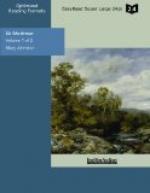Back to their fortress rode the Spaniards, up the bare, steep, pallid hillside, through the tunal, past their strong battery; back to the town rode the English, who with the punctilio of the occasion had accompanied their foes to the base of the hill. They rode through the streets which that morning they had laid waste, and through those that the stern Admiral had sworn to destroy. There black ruin faced them starkly; here doomed things awaited mutely. The town was little, and it seemed to cower before them like a child. Almost in silence did they ride, lifted and restless in mind, thought straining at the leash, but finding no words that should free it.
“How hot is the night!” spoke Baldry at last. “Hast noticed the smell of the earth? We killed a great serpent coming across the plain to-day.”
“How the sea burns!” said Henry Sedley. “There is a will-o’-the-wisp upon the marsh yonder.”
“Here they call it the soul of the tyrant Aguirre,” answered Ferne. “A lost soul.”
A little longer and they parted for the night to meet early next morning in the council with the Admiral. If to Nueva Cordoba, stripped and beaten, trembling beneath the fear of worse things to come, an army with banners held the land, so, in no lesser light, did the English see themselves, and they meant to have the treasure and to humble that white fortress. But it must be done quickly, quickly! Pampatar in Margarita, the castle of Paria or Berreo’s settlement in Trinidad, could send no ships that might contend with the four swinging yonder in the river’s mouth, but from the west at any hour, from La Guayra or Santa Marta, thunderbolts might fall. Would they indeed be wholly victors, then a general and overwhelming attack must soon be planned, soon made.
Weary enough from the day’s work, yet, when he and his fellow adventurers had exchanged good night, Mortimer Ferne went not to his quarters. Instead he passed through a dim corridor to the little cell-like room where was lodged Master Francis Sark, whom the English kept under surveillance, and who, under another name, had given to Pedro Mexia his knowledge of English speech and English history. What persuasion the Captain of the Cygnet used, what bribe or promise or threat, what confidence that there was more to tell thereby like a magnet compelling any wandering information, is not known; nor is known what hatred of his conqueror, of a gallant form and a stainless name, may have uncoiled itself to poisonous ends in the soul of the small, smug, innocent-seeming man to whom he spoke; but at the end of a half-hour the Captain of the Cygnet left his prisoner of the San Jose, moved swiftly and lightly down the corridor to his own apartment, where he crossed to the window and stood there with his eyes upon the fortress of Nueva Cordoba, rising shadowy upon its shadowy hill. So often had he looked upon it that now, despite the night, he saw with precision




